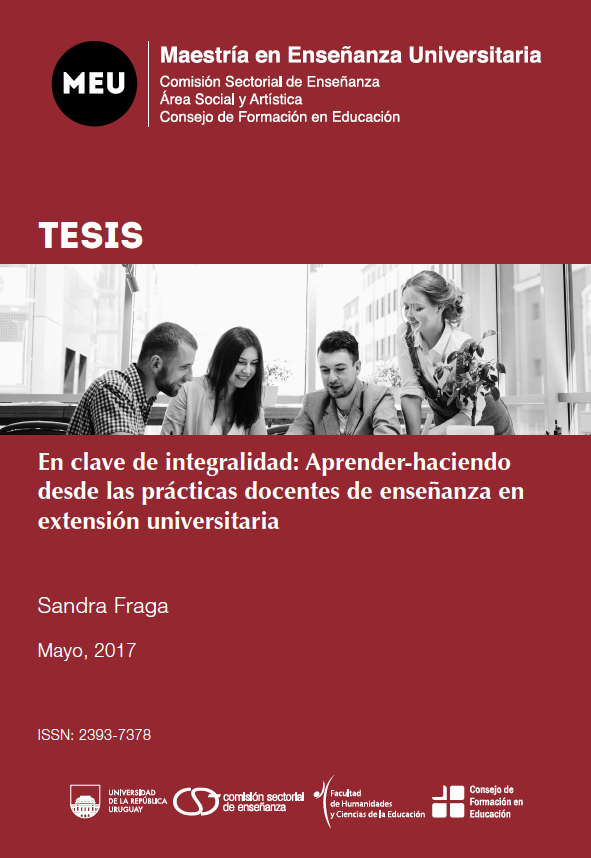Resumen
Esta Tesis se propone abordar el problema de las prácticas docentes en contextos de integralidad en el marco de los Espacios de Formación Integral (EFI) de Profundización. Estos nuevos formatos en la educación superior, enfrentan a los docentes al desafío de articular los aspectos pedagógicos en el marco de un trabajo integral desde un abordaje interdisciplinario que además integra otros saberes.
Se propone, desde el desarrollo de una investigación cualitativa, identificar propuestas de EFI con el fin de poder construir algunas categorías de análisis para intentar aportar a la solución del problema planteado. La misma se realiza a partir de un estudio de caso, a través de la metodología de observación participante y entrevistas.
Visualizamos algunos problemas que podrían surgir, sobre todo en el nivel de la ejecución y concreción de estas propuestas EFI. Entre otras cuestiones, es probable que surjan algunos desajustes entre el nivel teórico y el nivel de ejecución de las mismas. Estos elementos, así como la singularidad de cada situación concreta, podrían impactar desfavorablemente en la organización de las propuestas pedagógicas.
Se constituyen en objetivos de este estudio: conocer y caracterizar las prácticas de enseñanza que se despliegan en el EFI de Profundización “Prácticas Integrales en el medio rural”. Analizar los posibles desajustes que pueden surgir de las propuestas pedagógicas, para luego intentar realizar aportes didácticos y pedagógicos a los EFI que puedan ayudar a resolver probables desajustes en la intervención pedagógica.
A partir del trabajo de campo realizado, visualizamos que hablar de integralidad, no sólo supone que se hable de una forma de trabajo diferente que habilita encuentros, derribe muros en pro de la interacción de los universitarios con otros saberes, y a la vez integrando funciones, supone en sí mismo la transformación de la enseñanza. Sitúa a docentes y estudiantes en otras formas de hacer, de ser y de actuar, donde la afectividad es puesta en juego, y por lo tanto el abordaje humanista de la Extensión Universitaria, cobra otros significados. Produce intersubjetividad en el proceso de formación, donde la experiencia es eso que “me pasa” y se singulariza en cada uno.
Palabras claves
Formación, Experiencia, Integralidad
Abstract
This thesis proposes to address the problem of teaching practices in contexts of integrity within the framework of the in-depth Spaces of Integral Formation (EFI for its initials in Spanish). These new formats in higher education, would face teachers at the challenge of articulating the pedagogical aspects in the framework of an integral work from an interdisciplinary approach that also integrates other knowledge.
It was proposed, from the development of a qualitative research, identify EFI proposals in order to build some analysis categories to try to contribute to the solution of the problem. The same is done on the basis of a case study, through participating observation and interviews methodology.
We visualize some problems that might arise, especially at the level of the implementation and realization of these EFI. Among other issues, it is likely to encounter some mismatches between the theoretical level and the level of implementation. These elements, as well as the uniqueness of each specific situation, could impact negatively on the organization of the pedagogical proposal.
The principal aim of this study is to know and characterize the teaching practices that are deployed in the in-depth EFI named “Integral practices in a rural area”. Analyze the possible imbalances that may arise from the pedagogic proposals, to then try to make contributions of teaching and learning to the EFI to help solve probable mismatches in the pedagogical intervention.
From the field work carried out, we visualize that speak of the integrality, implies not only that there is talk of a different way of working that enables meetings, break down walls in pro of the interaction of the university students with other types of knowledge, and at the same time integrating functions, is in itself the transformation of education. Situated to the teachers and students in other ways of doing, being and act, where the affectivity is the most important, and therefore the humanist approach of the University Extension, takes on other real meanings. Produces intersubjectivity in the formation’s process, where the experience is that «happens to me» and singles out in each one.
Keywords
Academic education, Experience, Integrality
Director(es) de tesis
- Carmen Caamaño
Tribunal
- Alicia Cabezas
- Felipe Stevenazzi
- Carmen Caamaño
Fecha de Aprobación
03/05/2017
Dictamen
Aprobado



